Paul Sinton Hewitt - parkrun
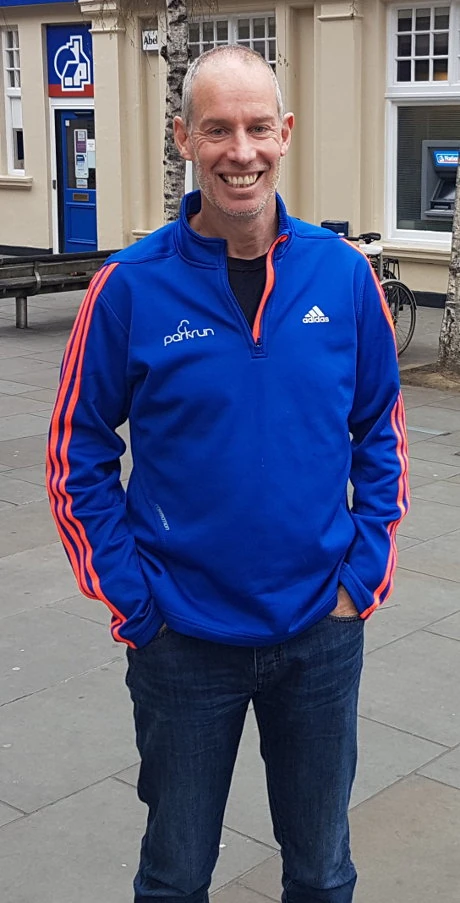
Paul Sinton-Hewitt is the founder of parkrun, the worldwide phenomenon that sees thousands rock up to local parks every Saturday morning to run a timed 5k.
We met in Richmond, just a few miles from Bushy Park where it all started back in 2004. As most conversations with runners seem to begin we share comments on recent injury woes. Paul is currently suffering with a knee problem and suggests it was an injury that led to parkrun's beginnings.
The Interview
We spoke to Paul in April 2017
psh: The big one that caused me to start thinking about parkrun is when I was training for the London marathon doing 100 miles a week.
I was racing in a mob match and had the dog with me and there was one point where I had to make a 90 degree right turn through a hedge and over a ditch. And as I went to make the turn the dog jumped in front of me and to avoid her I put myself into a somersault and messed up my left leg.
So, I was injured, but there were a whole bunch of things that conspired to bring about parkrun. I think this happens to a lot of us when we're in a really low patch. We decide, "Well I've got nothing to lose, I might as well just do what I want to do."
I was previously married then got divorced and over the next ten to fifteen years I went through relationships with a classic case of risk aversion. As soon as I realised the relationship might be going somewhere I walked away.
I'd been really successful in business and promoted well beyond my level of competence to really senior levels in organisations. Then I was the marketing director of a software company and I fell out with the owner of the company and got fired. Whilst I'd been made redundant a few times, being fired is a very different thing, very negative.
“Really I wanted to create a thing that almost ensured that once a week I would spend an hour or two with my mates”
So there I was, struggling in my relationships, no job, and facing the prospect of not being able to run. And being unable to run was the big thing. It wasn't so much the running as missing the people I would normally associate with when I went to the club.
I know enough about these things to know that whatever trouble you're going through in your life, you need to keep hold of the things that really matter and the things that are positive. And the people in my life were the positive things. So, I decided, OK, I can't run, and may not be able to for a while. I'm 44 and it's probably time that I gave something back to the running community.
So I considered what I could do that was unique and different and niche, but also what I could do for my community. Really I wanted to create a thing that almost ensured that once a week I would spend an hour or two with my mates.
The whole thing was planned so that the running part of it would always be simple and easy. It would need very few volunteers. It would be a case of pitching up, taking part, and going for coffee.
So the "going for coffee" thing was right there from day one. We'd go to Nero's in Teddington and spend the next two hours chatting and I'd do the results, which in those days were just on Excel spreadsheets.
I'd take everything and write a report and send it to The Richmond and Twickenham Times. My hope was that they would publish the results and that would encourage the people taking part.
But week after week they just ignored me, and I thought, "OK, I need to create a website." And along with that I created a database.
That's how it all started.
rb: It sounds like you were fairly organised from the very start.
psh: That comes from my background as a software engineer and working for very large companies like banks and insurance companies with detailed processes and documentation in place. That informed me that I needed to to build a set of rules that were available for everybody. So that everybody who was involved with parkrun could see what we stood for and how they would engage with us. So we have a very good set of guides, policies and how-to manuals, which are available to every single volunteer.
rb: Were you thinking back then parkrun might grow to be so massive?
psh: No. We knew it was good and the feedback from people was very positive. It was always my intention that everybody was welcome to come and run with the buggy, run with the dog, run with a child and for there to be no barriers.
“I rallied against doing more than one parkrun for a long time.”
Originally I thought it would be club runners who came down, but when we got to the point where most parkrunners were not club runners you started to see the real value and the real benefit of what we stood for. And it was those people who came to me and said, "Why aren't you doing more of these?"
I rallied against doing more than one parkrun for a long time.
A good friend, Jim Desmond, would say to me, "Are we gonna do another one,?" and I'd say, "No, why should we? Let's keep it simple."
rb: You were worried about complicating it?
psh: It wasn't just that. I'm enough of a marketeer to understand that what we had then wasn't really a product. I couldn't monetise it and I didn't want to, but if we were going to grow it there'd have to be an income and we'd have to change quite a lot of things. That was something I was clear I didn't want to do.
We dabbled with things like advertising and selling stuff, but it just polluted what we stood for.
But eventually Jim convinced me to do a second parkrun, which was Wimbledon parkrun. He presented a plan and we kicked it off in January 2007.
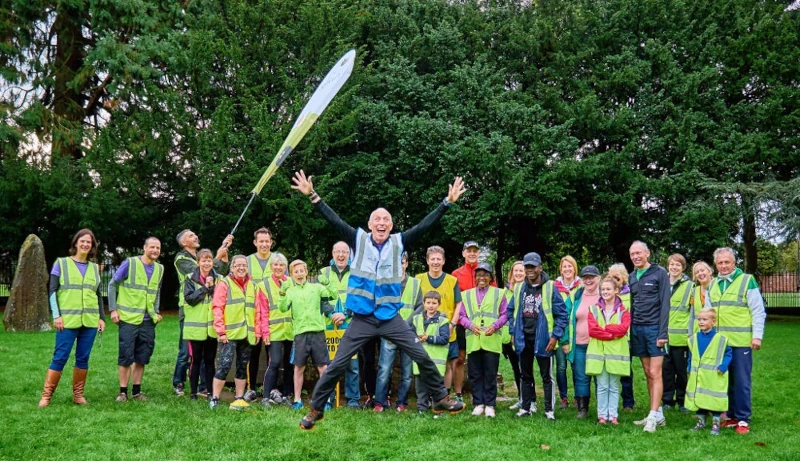
It was a big thing for me to walk away from Bushy Park. Any Event Director will know that you kind of feel like you own it. I had to give that all up and put other people in charge.
That was the beginning of building the future of parkrun.
I said to Jim I'd give him twelve weeks. We'll test it and if it works then great, and if it doesn't then we'll pack it in and go back to Bushy Park.
And it was really well-received by the locals, so we called for a meeting for anybody who wanted to be involved to come to the pub. About twelve people pitched up and all of them signed up to be part of that team. So I handed the reins over and that local team is pretty much still in existence today at Wimbledon.
rb: I noticed sawdust arrows at Wimbledon. Were they there from the start?
psh: Oh yeah, we got into quite a lot of trouble with the rangers. Their job is to protect their park, so I think when we were putting flour down for the arrows they realised that it wasn't good for local fauna and flora and as a result asked us to use sawdust.
Also, at first our course was not where it is today, and we'd have runners crossing paths with horses. Well, that caused a lot of conflict, and in the end we had to get in a meeting with the rangers and the stables and come to a compromise. So we moved our course and that seems to have worked ever since.
rb: As parkrun has grown, have there been things you've had to change, but didn't want to?
psh: Being quite honest there's lots of things that have changed that I didn't want to, but they've turned out to be for the best.
I didn't want to have defibrillators at our events. To begin with the whole concept was to keep it really simple. Don't grow the organisation, grow the footprint of parkrun. But that's completely unrealistic. We are so large and have such a position of responsibility in the community. Everything we do now has a bias towards, "Is it good for the community and is it good for the people in the community?"
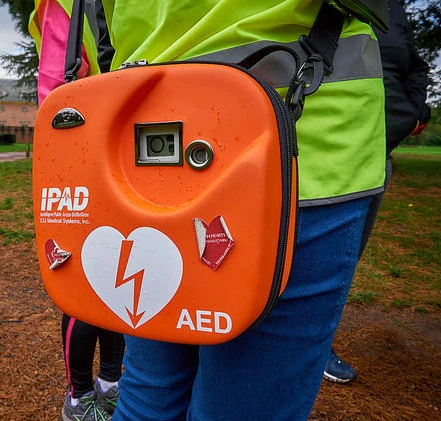
So, it's not really about running any more. Running is the key thing that gets us together, but if you look at the delivery of defibrillators we are making a fundamental change in every single community in which we go. There is now a piece of health and safety equipment that can help people outside of parkrun all week long.
Last weekend we attended to an individual who had nothing to do with parkrun. He just collapsed in the same park. That's the sort of impact that we're having.
If you look at the commercial growth of parkrun, which is fundamental to our existence, survival and growth, these are things that I didn't plan. They had to happen. And I had to do it in a way that didn't compromise our values. So for ten years or so we built relationships with companies like Adidas and Nike and they were complex relationships because we were trying to force a position where they didn't sell stuff, but of course their involvement with us is because they want to sell stuff.
Common sense tells you that that is going to be a problem.
Two years ago I brought in Nick Pearson and he and Tom Williams have been working in a thoroughly professional way to bridge the gap between a sustainable, growing base, and keeping parkrun exactly as it should be, based on our core values.
There are checks and balances that will mean that if the executives try to do something it has to be considered with the board.
So, there's very very little that I think we've done which I'm unhappy with. I think that we are still very true to our core values.
I like the fact that officially you do not have to be anything at parkrun. You don't have to volunteer, you can just come and participate, which is a core value.
rb: But parkrun needs volunteers to happen?
psh: Our view is that if you're a member of society then nothing is free. Everybody has an obligation to participate in what makes society good, and part of that is the volunteering model.
“I hate it when people say parkrun wouldn't happen without volunteers, because equally parkrun wouldn't happen without runners”
There are loads of people who run with us every single week and never volunteer, but it's their only opportunity to get out and do something in the week. Possibly they have a very difficult time at home or a difficult work life. Whatever it is their time will come when they're able to give something back. And we respect that.
I used to struggle with this a lot in the early days, primarily because when I started parkrun I didn't want to focus on the volunteering, I wanted to focus on the running. But we soon realised that we couldn't do this without volunteers.
A little bit later we realised that actually volunteering is a brilliant thing. It does so much for someone's wellbeing and benefits them in so many ways. So volunteering in itself became an objective. Volunteers are the most-important aspect of helping people change their lives.
But you can't focus on one side without the other. Everything is connected. So, I hate it when people say parkrun wouldn't happen without volunteers, because equally parkrun wouldn't happen without runners.
rb: Have you ever, for any reason, been tempted to digress from any of the core parkrun values?
psh: No, never.
The number of times people have said to me, "If you just charged a pound it would be acceptable." If we'd done that we'd have 20 million pounds or so in the bank, but that's never ever been our objective.
Clearly, we have to be sustainable and run the company in a professional way, with budgets and so on. But we're not focussed on money, we're focussed on delivering health and wellbeing and helping people be the best they can be and helping the world to be a better place.
rb: I remember an April Fool's joke in 2012 when parkrun said they were going to start charging, and it caught a few people out. Could you make that joke today, or would all hell break loose?
psh: I think posting something on April Fool's Day is absolutely fine. I mean, we can't all take ourselves too seriously. Of course our brand is important and we need to protect that and so on, but 99.9% of people involved with parkrun only want us to be the best we can.
Loads of people make mistakes all the time, and there's no point in us being overbearing about it really. We have a really positive, nurturing attitude towards our participants.
I remember at Bushy Park about nine events in and I was on the main timer. I got everybody perfectly, then the last runner came over and I stopped the timer and reset it immediately!
So I had to write to 250 people and ask if they could tell me what their times were.
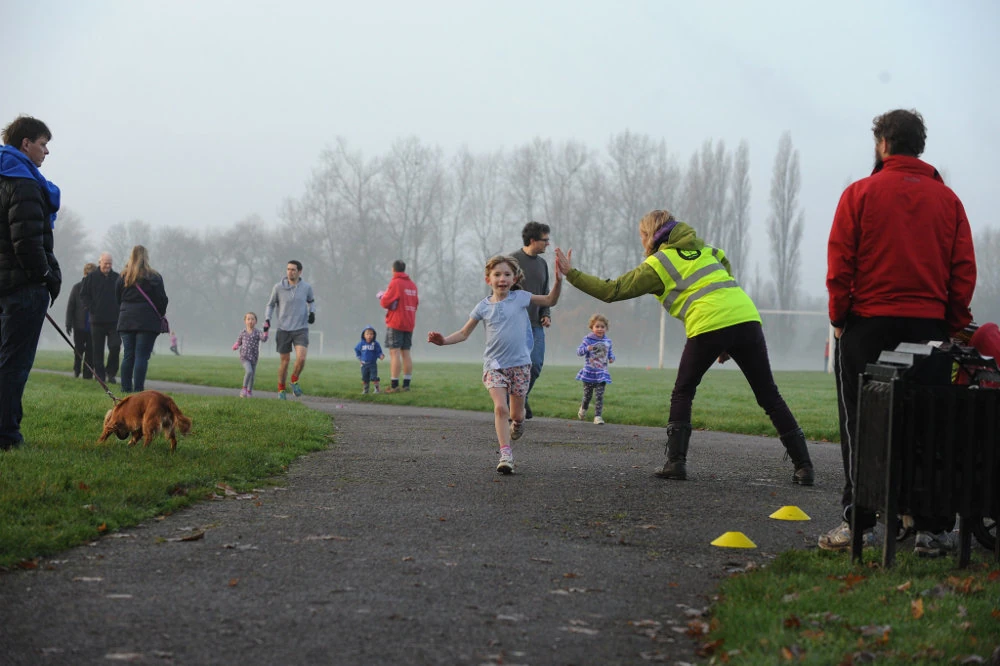
rb: Do you have a favourite volunteer role?
psh: I do volunteer every single week at junior parkrun, and the team keep sending me out and making me a marshall. That's the role that I think is the simplest and easiest role. I get to high five the children which is really great.
The Volunteer Coordinator role is perhaps the most-responsible role. That person feels stress about filling the roster. 99% of the time the rosters get filled, but there's still pressure.
The two roles on the day that are quite challenging are the timer, and handing out the finish tokens.
rb: Especially if you drop them.
psh: Well, not just dropping them, but making sure they're in the right order. Then you want to be engaged with the people so you're saying hello and at the same time you're being asked questions. At a big event you can have up to six people crossing the line at the same time so you've got to be focussed.
But there's nothing I struggle to do. It can be pretty nerve-racking to be the Run Director. But it's fun and enjoyable, and lots of people gain confidence and improve their presentation skills because of it.
rb: Do you worry about what's going on at all these events and feel you have to keep an eye on everything?
psh: I used to. I used to be so deeply entrenched and involved that I couldn't see the wood for the trees. I couldn't focus on the things that were important because I was dealing with so many day-to-day, moment-to-moment issues.
Whilst I still see stuff that bothers me I very quickly turn it over and move on, because I know that there's somebody in the team who's focussed on it.
rb: What bothers you more, people not writing parkrun all lower-case and as one word, or people referring to parkrun as a race?
psh: Neither really. 99.9% of people only want what's best for parkrun, and when one of those spells it wrong or calls it a race they are forgiven.
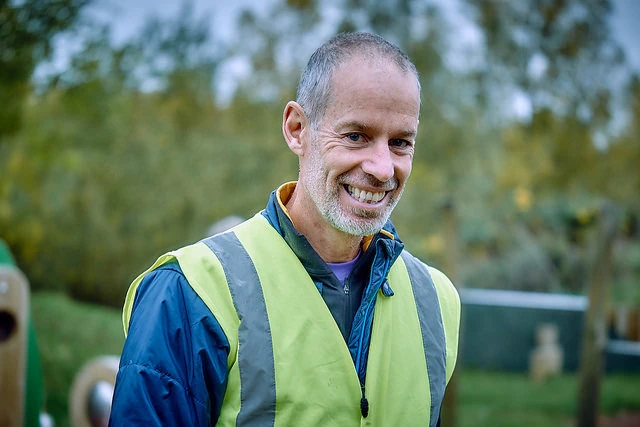
The people who really should get it right, and who I might think badly of for a moment, are the people who should know better. Companies, publicists, reporters, that sort of thing.
You won't believe the number of times somebody writes to us because they want to have a relationship with us and they will spell our name completely incorrectly and also call us a race. That's unforgivable because they've done no homework. They want something for nothing and it's not acceptable.
I think the worse of the two is to call us a race rather than to spell our name wrong because that misrepresents what we are.
rb: Is that because it makes it less inclusive?
psh: Calling us a race is like saying we're blue-blooded rather than red-blooded. The fact that we're not a race is a core principle of the organisation. It underpins almost everything that we do.
We're definitely not a race, we're a pleasant run in the park with your mates.
rb: It's great the way that the focus is always on something other than running fast. Are there any particular moments that you've found inspirational or memorable?
psh: Every single week there are examples. Last week I happened to be in Liverpool at Prince's Park and I think there were probably ten examples of something inspirational that happened on that day.
“All three of us gave up drink because of parkrun. We were all alcoholics”
There isn't a week goes past when somebody doesn't say to me that parkrun changed their lives, and some of that is just because they found a hobby, or were able to lose weight, but something happened this weekend that hadn't before.
Three men came up to me at the end of the run and they said the normal thing, "Hi Paul, just want to thank you because parkrun's changed our lives." I always enquire about how it's changed their life, and they said, "Oh, it's probably rather unusual, but all three of us gave up drink because of parkrun. We were all alcoholics."
There they were, these three different men, all saying that this free, weekly 5k run in a park had allowed them the strength to give up an addiction that was killing them.
If you dissect that and look really closely it's not the run. Of course, the run is making them feel healthier, and the healthier you are then the more you focus on being healthy. It's a step up every week where you say, "I can do a little bit more."
But it's not that. The thing that saved them is the community. The accessibility, the openness, the warmth, the welcome that the people in parkrun give each other. Everybody is interested in your story. Everybody is prepared to offer you a hand and get involved to some degree.
That's phenomenal. I mean, If you could bottle that, and you could sell it, we would be a completely different society.
rb: Do you get contacted much about using the parkrun model for other sports?
psh: On many occasions. We're very clear that parkrun is about the 5k, or for the junior parkrun, 2k. We're not going to broaden parkrun to be anything more than that. But we do care about society and we care about sports and activity, and wherever it's appropriate we're happy to help people understand our model so that they can use it.
So, we've met with almost every sporting society that you can imagine in this country. The swimming association, golf authorities, football, hockey, you name it.
I think there are a lot of people that can learn from parkrun. Although I think that any organisation that is driven by profit will struggle to embrace our model and do what we do.
There are other challenges. I worked with the organisation that delivers Ride London to try and bring "parkride" about. But it could never scale quite the way that parkrun scales because there aren't that many parks where you could actually have a bunch of people cycling round.
I think it works for swimming though as long as you can get the owners of the pool to make them available. It could be costly for the owners of a pool to give up an hour a week, but if more people are swimming as a result it could pay off.
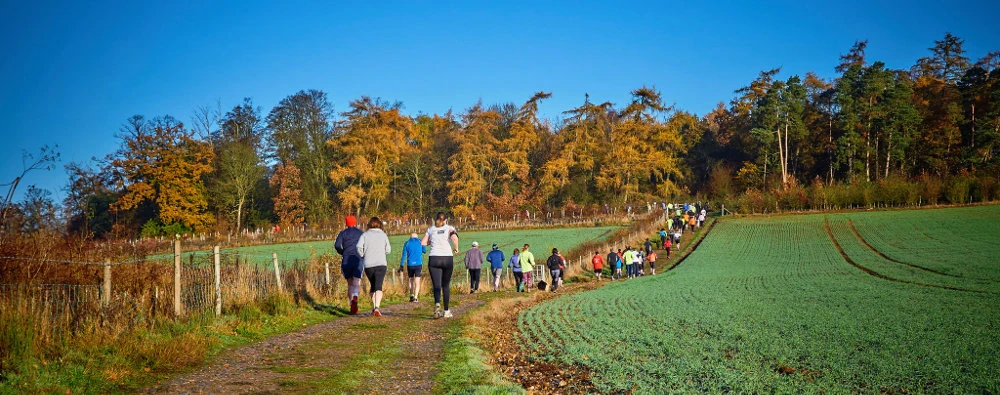
rb: parkrun's worldwide now and there are hundreds around the UK. Is there anywhere where it's been difficult or impossible to get set up?
psh: Starting in a new country brings a whole range of new issues. Probably the same problems that we faced here in the UK to begin with. There was a lot of opposition to parkrun in the early years.
There are parks we've been turned away from, but if that happens then we just go somewhere else. We're not going to waste effort fighting something that we can't win.
rb: Is there any parkrun trivia that people might not be aware of?
psh: Actually, yes. I went to run in Haile Gebrselassie's half marathon, and when I was there I managed to get Haile to sign two sheets of our barcodes. So I've got in my office somewhere two signed Haile Gebrselassie sheets of barcodes which I still don't know what to do with. So at some stage they'll be auctioned or given as trophies or something.
rb: There must be lots of old and interesting stuff lying around?
psh: The original tokens, which I got from Halfords and stamped the numbers on. There are a couple of old t-shirts, but I don't really hang on to stuff like that.
When we had a relationship with Nike they made me a pair of gold Nike Pegasus shoes with parkrun embossed on the side. I've never worn them.
rb: Dare you wear them?
psh: I don't think I ever will. I mean, I can't see myself ever wearing a pair of gold shoes to begin with.
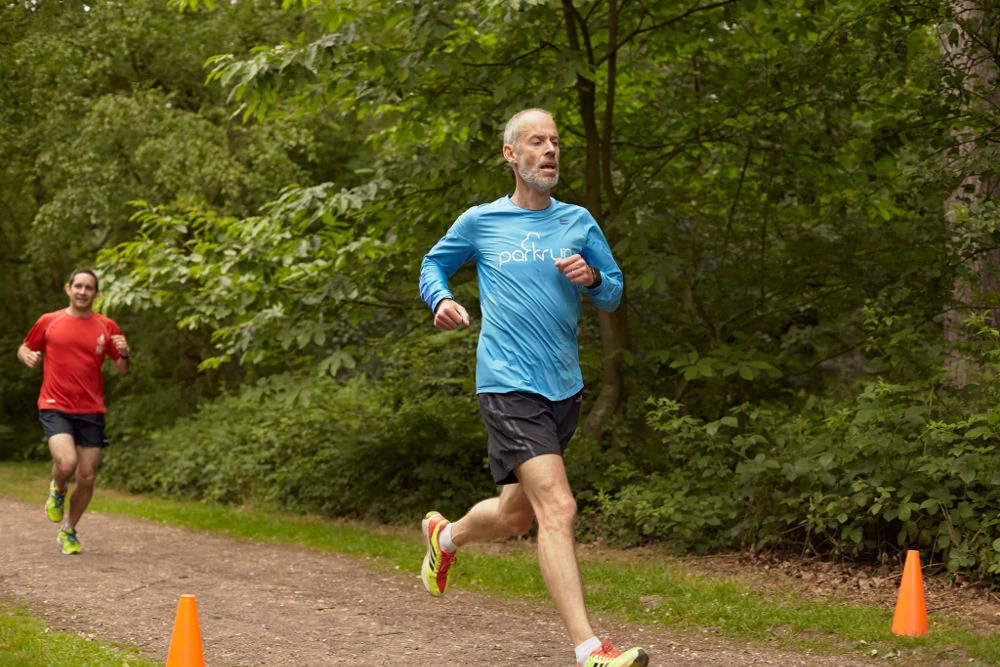
rb: It might draw some attention. Do you ever get to go to parkrun and just get left alone or do people always want to say hello to the founder?
psh: All the time. At parkruns I've never been to I do have a responsibility to go out and meet people who make it happen. I love meeting these people because they're brilliant but equally I like just being a parkrunner.
More often than not if I go to one of the original parkruns I'll be ignored. People just treat me as if I'm any other parkrunner. At Bushy, never ever. I mean, I've got lots of friends there who acknowledge me which is great, but no fuss is ever made. The same at Wimbledon and Banstead.
rb: Are you allowed to have a favourite parkrun?
psh: No, but what I always say is that my favourite parkrun is the one where the community is the strongest and the most engaged. And there are so many vibrant communities.
That's the positive thing about parkrun, it doesn't have a corporate image, it has a very local image. Every single parkrun is a real community of people, and these people are doing something not for parkrun, but for their community. parkrun just happens to be the glue that makes it all work.
rb: And changes people's lives?
psh: Ultimately you're the only person that can change your life. For instance, when I was starting parkrun my life was in the toilet, and I had made a conscious decision that I was going to fix that.
“If you want to keep your life fresh you learn two new things a year.”
I decided that there were a few things that I was going to do that would help me rebuild the things that were failing in my life. My relationships, my physicality, my emotional state, my work life and so on. So I made a decision to get back into running and I made a decision to do paragliding. Then parkrun came along and became so important that I had to give up the paragliding.
It's the age-old story that if you want to keep your life fresh you learn two new things a year. That's what keeps you young and fresh. You pick up a new language, you decide that you're going to do theatre. My best friend at the age of 40 learned to swim.
Millions of people are changing their lives and they're using parkrun to do that because it's engaging and easy and simple and encouraging. It shepherds people towards a change in life. They always say, "parkrun did that", but really they did it.
The run in itself is just a run. Great things happen, but that in itself is not life changing. What is life changing is the fact that it happens every single week, and that there's this community that engages in helping people be as good as they can be.
rb: Have you always been fairly driven?
psh: I've been a driven person from the word go. If you asked people who I worked with in the early days they'd probably say I was an obnoxious git.
“If you asked people who I worked with in the early days they'd probably say I was an obnoxious git.”
I was very opinionated, very clear on what the answer was, and not afraid to tell other people how to get there. I just think that's mostly immature and I knew no other way than just to decide what direction I was going in and then put everything in to getting there.
Throughout my life I've always suffered from depression of one kind or another and running was always something that helped me keep that under control. For a long period things just got better for me. I got married, had children, got promoted, travelled the world and did all sorts of wonderful things.
But when you hit a roadblock of course you have to look inside and ask what you can do about it. How can you be different? And the answers aren't always quick, sometimes they take a very long time to come.
It's a very lucky person who doesn't have to rebuild their life at some time. I think almost every one of us goes through some form of needing to change and repair things. And when you have an activity like running in your life and you have a community like parkrun to support you there's a good chance you're going to make the right decisions and you're going to get yourself back on track.
rb: One more question that we ask everybody. If you could race against any athlete from any era in any race. Who, when, where, what would it be?
psh: I have heroes in my life. People who I really admire and in the sporting world people like Zátopek, Haile Gebrselassie, Dave Moorcroft, Bruce Fordyce, Usain Bolt, Mo Farah. There are a list of people that I look up to and think they're both wonderful people but also have achieved incredible things in their lives.
However, if I could have my own fantasy race, then I would like it to be a marathon where I run under two and a half hours and come second to Nelson Mandela.
rb: And would it be close?
psh: Oh yeah, we would run the whole race together. It's a race so I would have been taunting him and he would have been taunting me.
rb: So Nelson Mandela is one of your big heroes?
psh: Oh, he's at the top of my list. There are other really really important people, but he's right up there at the top. Clearly because I was born in Africa and he did so much for the continent and I think he showed the world that you can be a forgiving and kind and generous person and still be a winner. You don't have to be a shit to win. To be honest, that principle does exists in parkrun and I think that all of the parkrun employees are as happy as they possibly could be, because this is how we live our lives. We are associated with something that we're passionate about.
rb: That sounds like a lovely message to end on. Thanks so much for the speaking to us, Paul. Might see you at a parkrun soon.
rb: Check out the results of the PSH/Mandela smackdown.
Keep up with Paul on Twitter. And if you're not already signed up, get down to a local parkrun